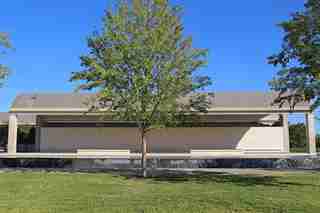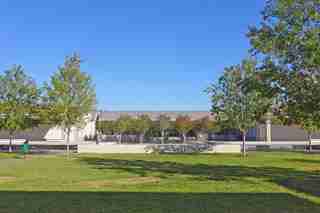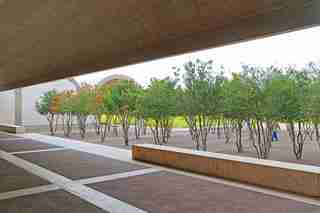
dam-images-daily-2014-12-tae-texas-texas-kimbell-art-museum-02.jpg
One of Kahn’s column-free, 100-foot-long vaulted cycloids covers an exterior space at the entryway, serving as a form of outdoor sculpture and a preview of the building’s signature arches.

dam-images-daily-2014-12-tae-texas-texas-kimbell-art-museum-01.jpg
The tree-filled entry courtyard to the Louis Kahn–designed portion of the Kimbell Art Museum in Fort Worth, Texas.

dam-images-daily-2014-12-tae-texas-texas-kimbell-art-museum-04.jpg
When I was a student of Kahn’s, he often spoke of the lessons that can be learned from Roman architecture, particularly the use of vaults. At the Kimbell, that influence comes to fruition in contemporary form.
dam-images-daily-2014-12-tae-texas-texas-kimbell-art-museum-06.jpg
A view through the entry bosk to the exterior vault.
dam-images-daily-2014-12-tae-texas-texas-kimbell-art-museum-07.jpg
The vaults end at the Noguchi sculpture garden at the museum’s lower exterior level.
dam-images-daily-2014-12-tae-texas-texas-kimbell-art-museum-09.jpg
Kahn’s vaults have Plexiglas-covered openings at the top and a series of silver-winged baffles inside that evenly distribute light throughout the museum. Note how Kahn used natural light, concrete, travertine, and wood here as primary, complementary design components.
dam-images-daily-2014-12-tae-texas-texas-kimbell-art-museum-08.jpg
L’Air by Aristide Maillol sits in a vaultless open courtyard.
dam-images-daily-2014-12-tae-texas-texas-kimbell-art-museum-10.jpg
Flat roof sections connect the vaults.
dam-images-daily-2014-12-tae-texas-texas-kimbell-art-museum-11.jpg
A light baffle in the two-story conservation studio.
dam-images-daily-2014-12-tae-texas-texas-kimbell-art-museum-13.jpg
The Kimbell was a small museum, and an expansion was clearly needed. Rather than adding onto an iconic building, Renzo Piano designed a separate structure opposite Kahn’s.
dam-images-daily-2014-12-tae-texas-texas-kimbell-art-museum-14.jpg
The low-slung, colonnaded Renzo Piano Pavilion with overhanging eaves graciously acknowledges Kahn’s design. Like Kahn, Piano placed an emphasis on natural light and used concrete as a primary material. Here, a glazed canopy over glue-laminated-wood beams.
dam-images-daily-2014-12-tae-texas-texas-kimbell-art-museum-15.jpg
Echoing Kahn’s structural mastery in poured conical vaults, Piano uses a series of elegant laminated-wood beams that achieves similar mass and scale to the original building.
dam-images-daily-2014-12-tae-texas-texas-kimbell-art-museum-16.jpg
Elevated wood floors allow for flexible configurations for installations.
dam-images-daily-2014-12-tae-texas-texas-kimbell-art-museum-03.jpg
Vaults seen at the entry court.
dam-images-daily-2014-12-tae-texas-texas-kimbell-art-museum-17.jpg
A canted concrete wall at left frames the entry to the auditorium of the Renzo Piano Pavilion.
dam-images-daily-2014-12-tae-texas-texas-kimbell-art-museum-05.jpg
Water surrounds two sculptural vaults that frame the entry.
dam-images-daily-2014-12-tae-texas-texas-kimbell-art-museum-12.jpg
Note the ordered lighting plan in the staff area under an exposed concrete slab.
dam-images-daily-2014-12-tae-texas-texas-kimbell-art-museum-18.jpg
Acoustic panels in Piano’s concrete auditorium.
dam-images-daily-2014-12-tae-texas-texas-kimbell-art-museum-19.jpg
A view from the Piano Pavilion to the open courtyards that gracefully connect spaces at the Kimbell Art Museum.
